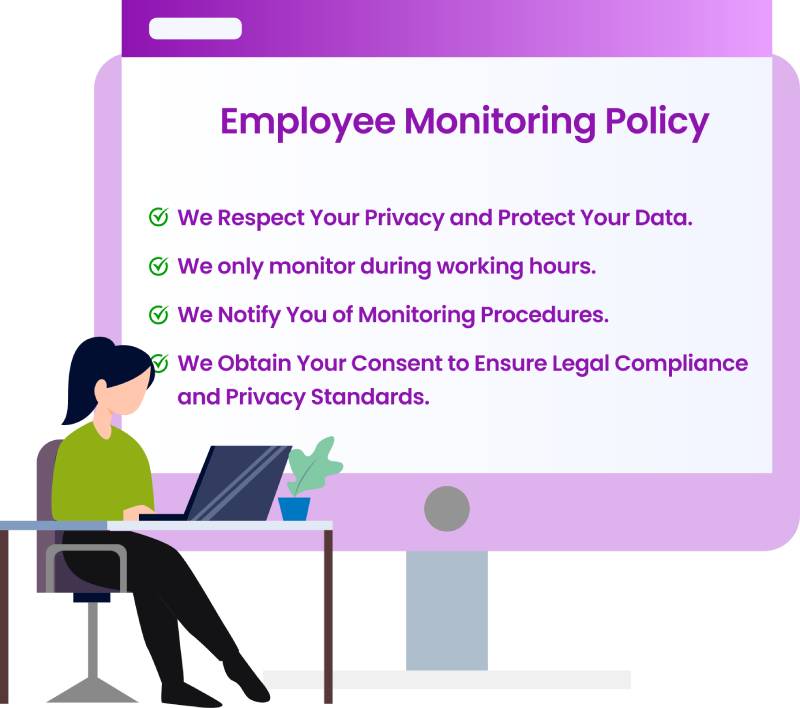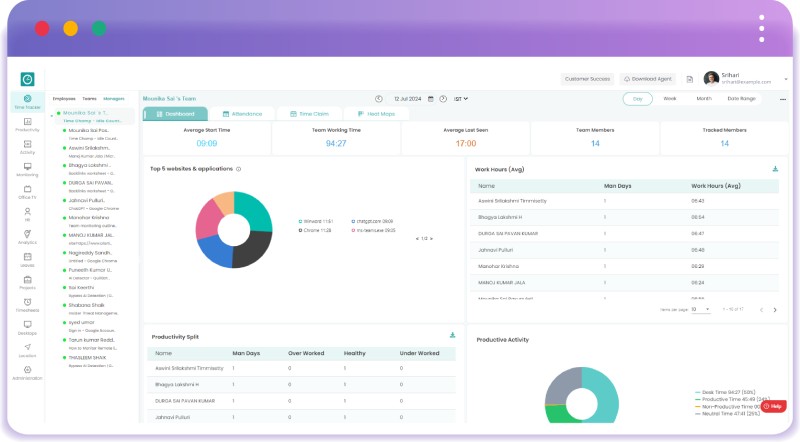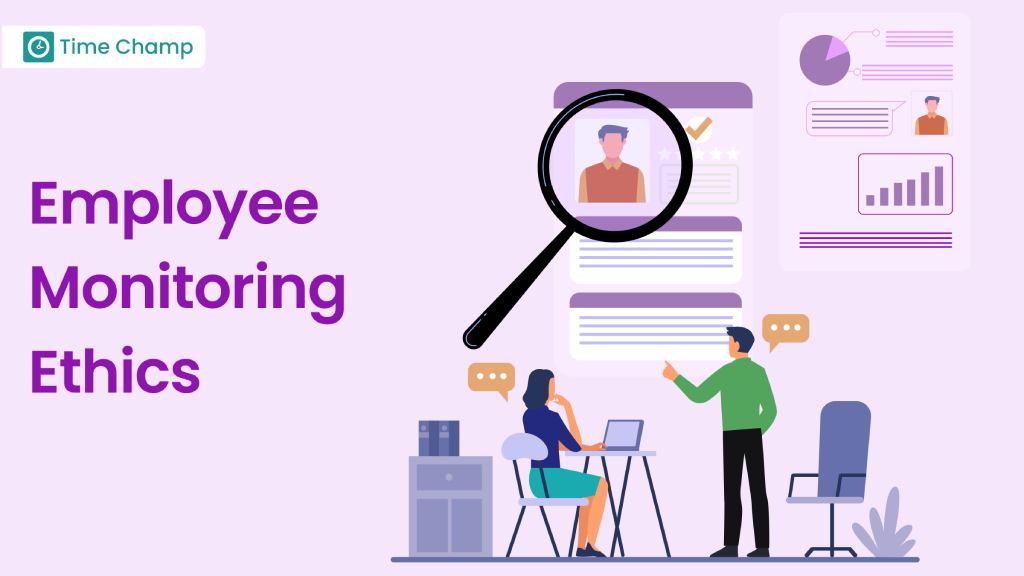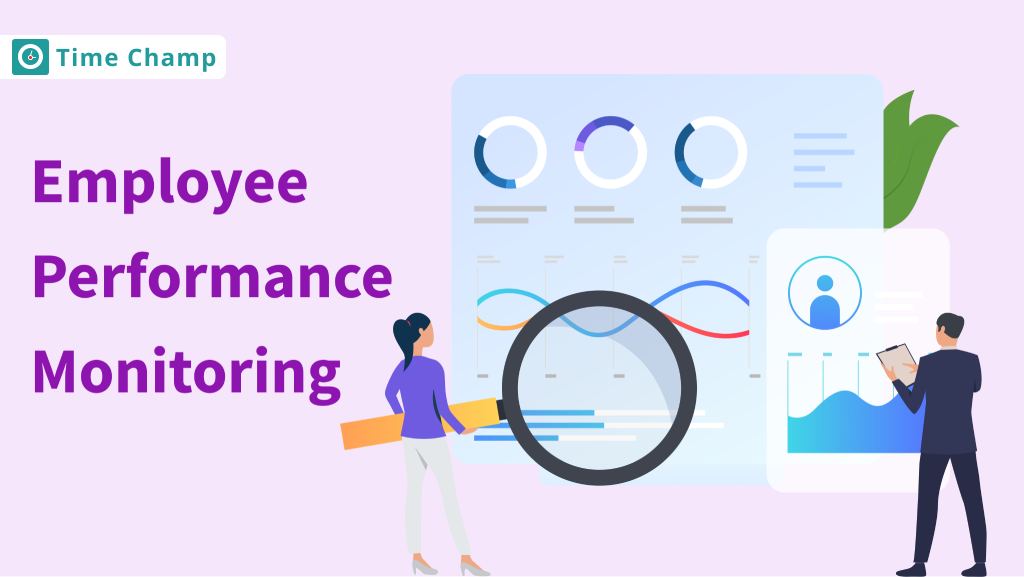To boost productivity and protect information, many organizations prefer monitoring employees. But it should be done ethically.
Yes!! You read it right!
There are employee monitoring ethics that should be considered. In this blog, we’ll delve into detail about it.
How does Monitoring Employees Help the Organization?
As a Manager or admin, you know the importance of ensuring that your employees perform their duties efficiently and follow legal policies. This is where monitoring employees plays a crucial role.
Here are some reasons how it helps your organization:
- Increases Productivity: Monitoring employees helps the organization understand how employees utilize their time (such as productive and unproductive activities) and what areas may require improvement. It’s about making sure that everyone uses the resources efficiently and remains focused on their assigned tasks, which boosts overall productivity.
- High Security: Employee monitoring is quite effective in preventing data breaches because it involves keeping a closer observation and analysis of the activities of the employees. It helps to spot areas of risks and activities that can harm an organization’s security. For example, monitoring can detect whether an employee is browsing through the restricted sections or whether they are peculiarly downloading data.
- Better Resource Management: Monitoring the usage of company property, including equipment, software, and other resources, helps to prevent their misuse. It helps in identifying areas where resources are best utilized. It helps in keeping all the necessary things in order and easily accessible to run company operations smoothly.
- Performance Evaluation and Feedback: Employee monitoring gives information for performance reviews, thus enabling you to compare the performance of the employees. It encourages positive feedback and helps to identify the areas of improvement and develop the employees through training and development.
- Legal Compliance: Employee monitoring helps organizations observe whether employees are adhering to the laid down rules and regulations for their position. For example, it ensures they do not leak restricted information such as customer information under privacy regulations.
Ethical Considerations for Implementing Employee Monitoring
1. Create an Employee-Friendly Monitoring Policy:
Before you start monitoring employees, it is important to create an employee-friendly monitoring policy. The monitoring policy should include what will be monitored and why monitoring is needed. It is important to inform the employees about their rights and responsibilities and how the monitoring process will be conducted to ensure they feel comfortable with it.

2. Be Transparent about the Purpose of Monitoring
Communicate clearly about the purpose of the monitoring. Also explain what data will be monitored, how it will be processed, and who has access to view the data. Transparency gives employees an idea of how monitoring information may affect their privacy. This openness creates trust among employees leading to a positive environment.
3. Limit the Scope of Monitoring for a Positive Environment
Make sure that you only monitor what is relevant to the organizational goals and objectives. To keep the balance between professional and personal life, it is better to monitor only the resources related to work or during working hours. This approach not only promotes a positive environment but also respects employee’s boundaries.
4. Promote an Open Feedback Culture among Employees
It is a chance for the organization to develop, so you should encourage employees to share their opinions. Explain and justify why such a program should be implemented, and at the same time, make employees consider what data they would like to receive regarding their work and how the company should use it.
5. Be Fair and Non-discriminatory
Apply monitoring to all the employees without targeting any specific individuals based on age, gender, race, nationality, etc. It is important to be fair when implementing monitoring in an organization. These practices promote diversity and equality in the workplace where everyone is treated with dignity and respect.
6. Follow the Monitoring Law:
It is important to note that there are legal monitoring laws that describe how and when employee monitoring can be conducted. Such laws set the boundaries of what can be monitored, and what data can be collected.
In many countries, there are specific laws concerning the monitoring of electronic communication, surveillance through cameras, and GPS tracking.
Know more about Employee monitoring laws
7. Protect Data Privacy and Security of the Employees
Employees trust the organization expecting that they will secure their personal information and work data. It is mandatory to use safety measures to keep the data safe and limit who has access to it. It shows how the organization respects employee’s privacy rights, which leads to building trust and reduces the risk of data breaches.
8. Choose Good Monitoring Software
It’s important to choose an employee monitoring software that should track activities but at the same time, it should be simple to use and safe. Time Champ achieves this by providing a user-friendly interface that can easily be integrated with other systems. It tracks activities and offers detailed reports that help the management of the organization while ensuring that security and compliance are met.

Consequences of Not Considering Employee Monitoring Ethics
1. Decreases Trust and Morale
Lack of ethical concerns may lead to employees feeling that their privacy is being infringed or that their employer does not trust them. This can lead to a situation where the management and the employees do not trust each other, leading to low morale and less commitment to the organization.
2. Legal Issues
Violation of Privacy Laws: Privacy laws across different countries explain how personal information will be protected and collected. If an organization monitors employees without their consent or if the monitoring is beyond what is legally allowed (for instance, monitoring personal matters that do not relate to work), then the organization is violating privacy laws.
In India, there are employee data protection and privacy laws under the Information Technology Act, of 2000.
Learn more about this at Information Technology Act, 2002
3. Impact on Company Culture
Unethical monitoring practices can be harmful to the company’s culture by creating an atmosphere where employees feel like they’re being spied on. Such a climate can become unhealthy, and it leads to employees quitting their jobs. People are productive when they are trusted and valued; a bad organizational culture can slow down sustainable business and retain talented workers.
4. Decreases Employee Performance
When employees are monitored in an excessive and unethical manner, they are likely to become stressed and anxious, thus their performance is likely to be affected. The constant monitoring can cause stress and demoralization, which in turn affects the level of satisfaction with the job.
Conclusion
Monitoring employees for productivity and security reasons is essential. However, it should be done appropriately to avoid problems. There should be a clear policy on work-related issues while also respecting employees’ privacy. When monitoring is ethical, it develops trust and a positive organizational culture that motivates the employees to perform their best.






